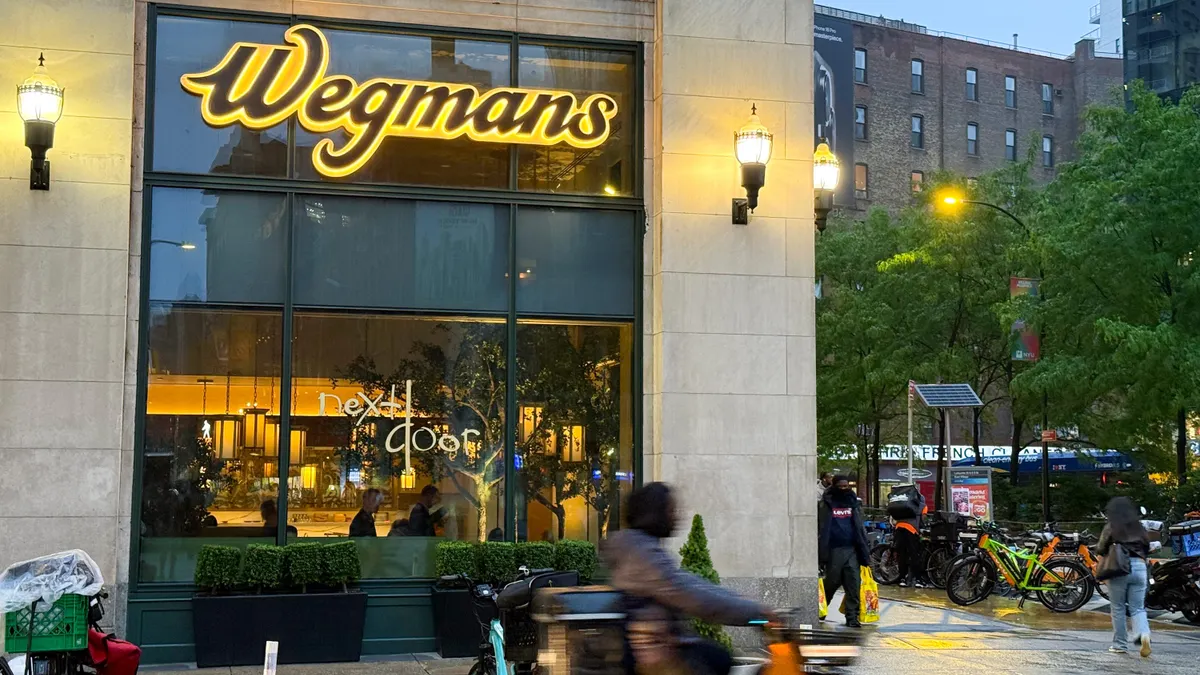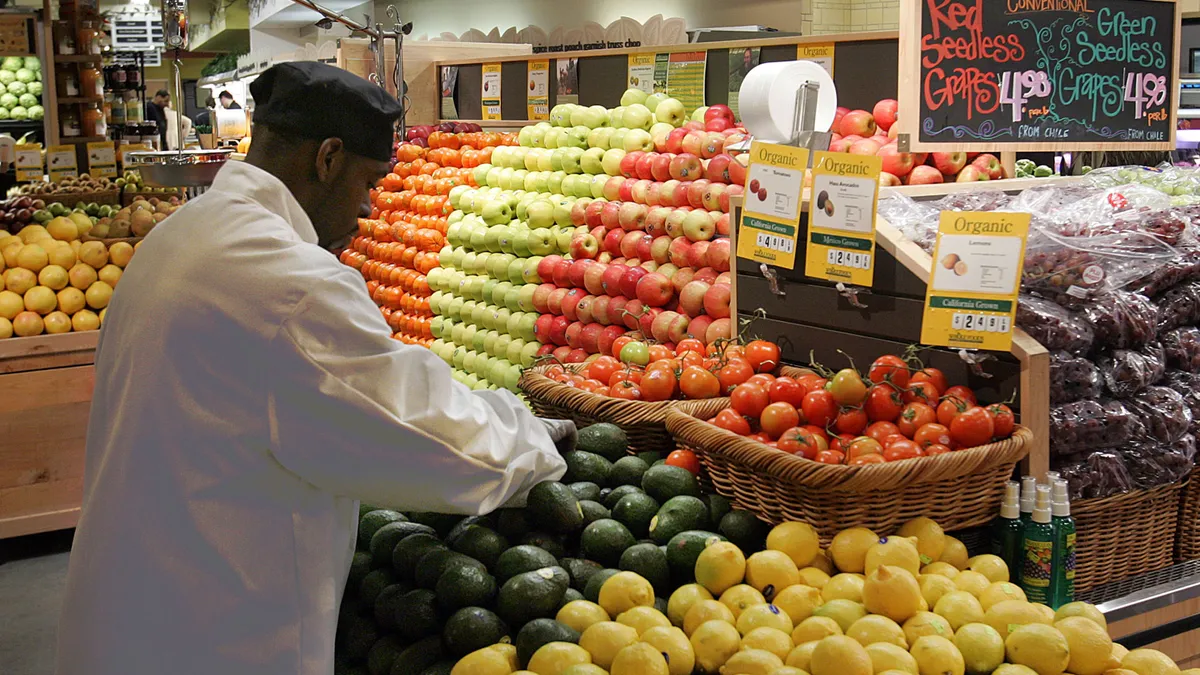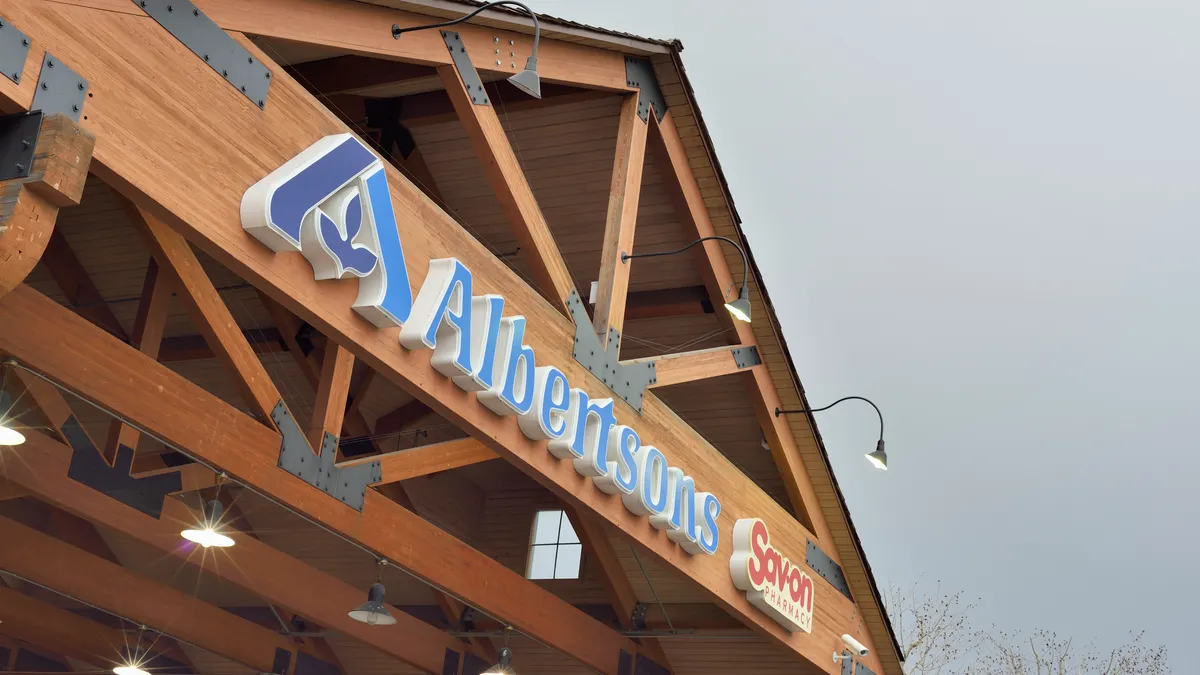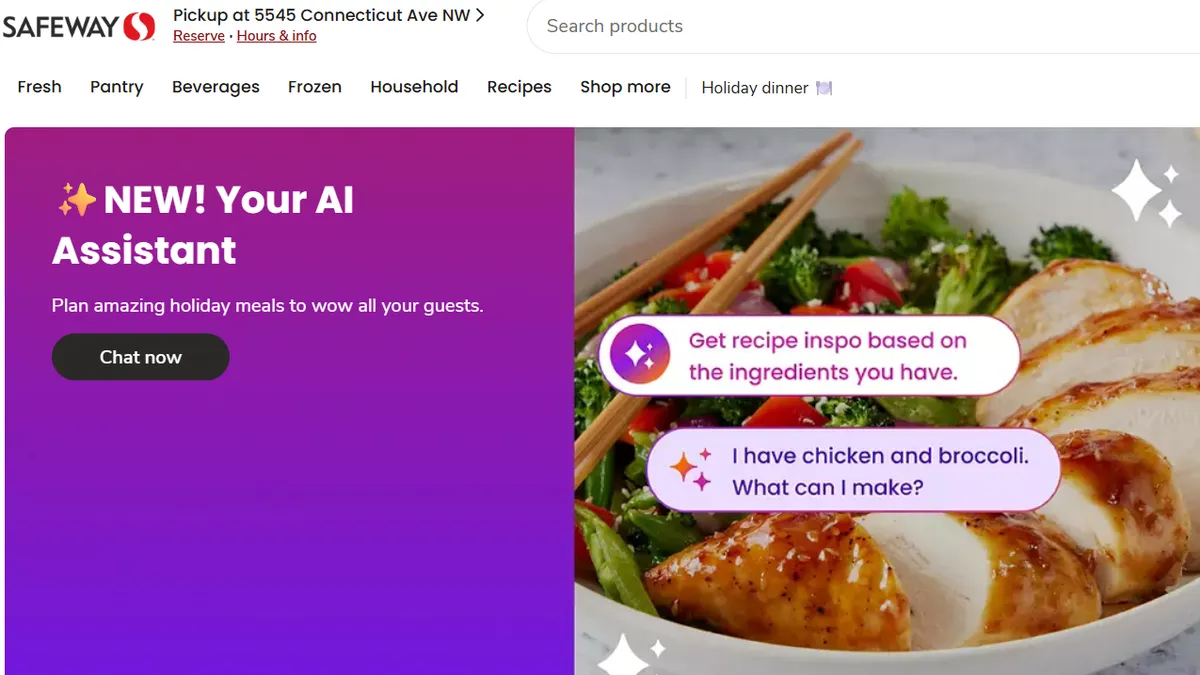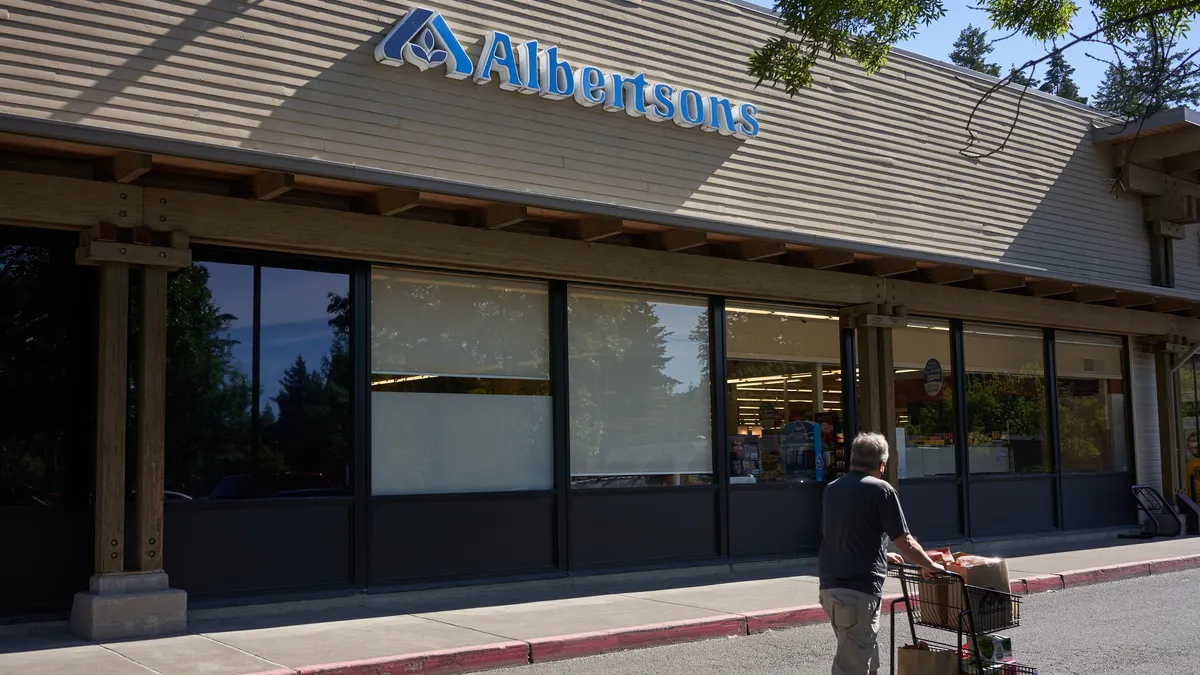This is the third article in a four-part series looking at labor issues affecting the grocery industry. The first two stories can be found here and here.
Tech innovation has been the center of the grocery industry over the past few years. Robots now roam the aisles at hundreds of stores across the country. Numerous retailers have rolled out mobile self-checkout, and a few like Kroger and Walmart have taken the reins on autonomous vehicle delivery.
Retailers have relied on third-party firms to supply many of these advancements. But if retailers plan to take their in-store technologies and e-commerce platforms to the next level, they have to invest in their own tech workers, Marc Rousset, partner at retail consultancy Oliver Wyman, told Grocery Dive.
It’s easier said than done. The tech labor market is growing rapidly, but so is demand, with companies across all industries hiring rapidly and offering splashy salaries and benefits for top talent. Last month, companies added 104,000 information technology workers, increasing for the fourth consecutive month, according to a report by IT trade group CompTIA. Tech firms hired 11,400 workers in August, 70% of them being tech-related positions.
The number of graduates in science, technology, engineering and math fields — commonly known as "STEM" — has been increasing since the Great Recession. According to the Public Policy Institute of California, that state alone had 35,000 STEM graduates between 2016 and 2017, an increase of nearly one-third from the period spanning 2010 to 2011.
Experts say these grads along with many others are open to working for companies outside of the top firms — so long as the offer is right and companies can pitch themselves as compelling places to work.
"I think grocery is attractive because in a lot of other areas they're not experiencing the same pace of growth, and they don't have the same opportunities for career advancement," Mike Molitor, vice president of e-commerce at Raley's, told Grocery Dive. "Come in, prove yourself, and you can move up rapidly."
Competing with the FANGs
Grocers are competing against the top dogs in the industry like Facebook, Amazon, Netflix and Google (also called "FANGs") for tech talent, said Rousset. These and other highly capitalized companies offer competitive salaries, fun work environments, a career trajectory and skill development — all in or near major metropolitan cities.
In order to attract more in-house tech talent, grocers can embrace trends like remote work, Rousset explained. Many grocers aren’t located in cities that are attractive to the tech talent pool, and a remote work option could remove that barrier, he said.
The new workforce is accustomed to remote work. According to a Flexjobs survey, in the last five years remote work grew 44%, and 85% of businesses confirmed that productivity has increased due to increased flexibility. There are currently no food retailers on Flexjobs' list of "Best 100 Companies for Remote and Flexible Retail Jobs."
Remote work may be conducive to some retail tech positions but not others, like building hardware and testing it in stores. Other ways grocers can reach these potential employees is by staffing tech divisions in major cities. Boise, Idaho-based Albertsons for example, operates a tech division in San Francisco.
"We've been fortunate enough to attract several folks from different startups and from other established retailers to help us grow," Narayan Iyengar, senior vice president of digital and e-commerce with Albertsons, told Grocery Dive. "Our big pitch to them is that food is one of the larger sectors out there, (that) everyone has to eat and it's going through a fundamental transformation. If you paint a broad picture, a vision and show ambition, I think that's resonated with several digital and tech workers that have chosen to come join us."
The FANGS are where most students graduating with tech-related degrees are looking to be hired, Rousett said, but in reality these jobs are limited. Grocers can elevate their profile by playing up their wealth of consumer data, he noted.
“Really marketing the opportunity from a data science standpoint is probably their best bet in pulling more of these folks in," Rousset explained.
Molitor, who came to Raley's after working for Kohl's, PetSmart and Victoria's Secret, said he pitches software developers and other tech workers on the opportunity to get in on the ground floor of an industry's digital transformation. He sees all the demand for FANG jobs as part of a "me-too syndrome" that some promising workers want to buck.
"It is really about that person that buys into our mission and values, and this idea of doing something a bit different," he said. "Going to those traditional places, they're one of an army of software developers."
Still, compensation is important, and grocers' budgets for salaries and perks often pale in comparison to those of tech firms. But Rousset said retailers will have to come up with competitive offers and strategically map out a tech labor strategy.
“In an age where we see a lot of value extracted from better technology, analytics, insights, you have to invest in human capital and you can’t tighten your belt out of this problem," Rousset said.
"Our big pitch to them is that food is one of the larger sectors out there, (that) everyone has to eat and it's going through a fundamental transformation.

Narayan Iyengar
Senior VP of digital and e-commerce, Albertsons
Places to work and play
Walmart, which has invested deeply in retail tech innovation in recent years, told Grocery Dive that finding tech talent is a top priority for the retailer. "Hiring in tech overall is a very high priority and our team of engineers, data scientists, and other technologists internally has grown substantially," a company spokesperson told Grocery Dive in an email.
In an effort to attract more tech talent, Walmart offers various programs aimed at boosting interest and making the company competitive with top firms. One, in particular, is what Walmart calls a "returnship," an internship for technologists who have taken extended leave to raise children, care for parents, or for medical reasons. The 16-week program is offered to men and women who have at least five years of professional experience. The majority of roles in the program fall under product management, software engineering, and data science and analytics.
"We had more than 30 women successfully complete returnships in our Silicon Valley office and retained three-quarters of them in full-time roles," said Bobbie Grafeld, VP of People for Walmart Labs, in a press release.
Retailers are also taking a page out of tech firms' playbooks and creating dedicated workspaces meant to foster creativity and collaboration. In June, San Antonio, Texas-based H-E-B opened an 80,000-square-foot tech hub in Austin, Texas. It has an open-office design for its individual work spaces, with designated areas for open collaboration and more than 50 meeting rooms. It also has a coffee bar with local roasts, a lounge, a wellness center, gym, rock-climbing wall, showers and bike parking. The company has a shuttle that travels between its headquarters in San Antonio and the Austin tech hub.
Hy-Vee describes its recently opened tech hub near its Des Moines, Iowa headquarters as a space that promotes "creativity and collaboration," the Des Moines Register reported. The space features a Starbucks coffee shop, a walking track around the perimeter of the building, Xbox and Playstation game desks, a collaboration space that is modeled after TV show "The Big Bang Theory," conference rooms named after video games, a basketball court and games like Billiards and foosball.
The inspiration for these workspaces stems from Google's famous Mountain View, California campus, said Doug Baker, vice president of industry relations at the Food Marketing Institute.
"It’s tough to get a young millennial to Des Moines, Iowa among the cornfields unless they have a history there, so to do that (Hy-Vee is) putting in those benefits they’re interested in," Baker explained.
Grocers are also linking up with college tech programs, Baker added. Last year, Kroger partnered with the University of Cincinnati to operate a research and development lab inside the school's 1819 Innovation Hub. Kroger is in charge of staffing the lab with resources, engineers and software developers alongside UC faculty.
In addition to innovations for its own stores, Kroger also operates Sunrise Technology, which creates and licenses store technologies to other companies around the industry. Kroger Technology, which lists on its LinkedIn page a goal of becoming "most valued technology organization in retail," was named one of the best places to work in IT by Computerworld last year.
"(Retailers are) trying to get involved much earlier on, hopefully before the student has made the decision where they’re going to start their career," said Baker.
FMI is helping grocers build on these initiatives. The institute takes food retailer CIOs to partner colleges and has them interact with the students and promote grocery as an attractive place to work. FMI's program also allows the industry to learn from the academic institutions, Baker explained.
"What I’ve been trying to do is take the industry to academia rather than bring academia to the industry," he said. "To help them learn that it's not just cashiers and meat cutters or produce clerks, it’s actually this whole other ecosystem that supports the industry behind that."
FMI currently has six college partners and Baker said they're open to working with any college that is interested in helping them help the grocery industry.
Recruiting efforts aside, grocers can also offer bonuses, flex time, wellness programs and continuing education. More than anything, retailers need to view technology as part of their culture rather than just an add-on, experts said.
"Grocers are naturally cautious companies and they tend to be dogmatic with tech," Rousset said. "To capitalize on tech you have to be flexible. You can see these trials and tests happening. You still have to change the mentality of the workforce."






